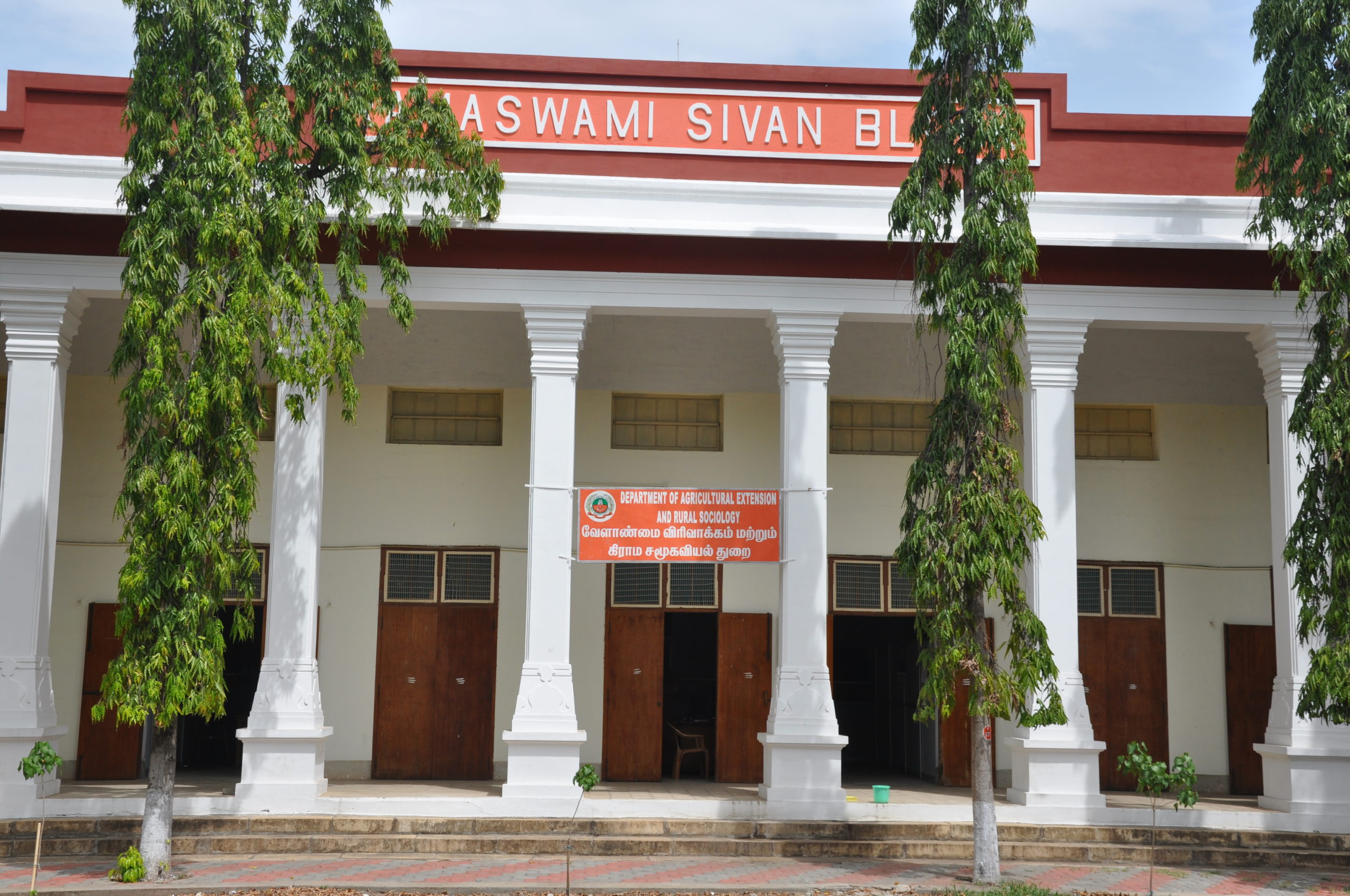
Mobile App for Rice Pest Management : M-Velanmai
(The M-Velanmai mobile app is available for download — please download and use it for updated agricultural information and services)
MANDATE
- To organize teaching in Agricultural Extension with a view to provide professional competencies for students and personnel at various levels in Central, State Government, Public sector undertakings and commercial agencies.
- To undertake research in Agricultural Extension for expanding the knowledge base in the discipline, contributing to the formulation of social policies and providing guidance to the development agencies.
- To publish books, monographs, research papers and policy briefs for use of academic and extension functionaries.
- To arrange lectures, seminars and webinars etc. for the benefit of students, academics, extension workers and development officials.
- To collaborate with the activities of all line departments for the mutual accomplishment of university goals.
MILESTONES
1959 – Creation of Extension Section of Agricultural College and Research Institute, Coimbatore
1962 – Recognition of Agricultural Extension as a subject for B.Sc. (Ag.) degree.
1968 – Creation of Post-Graduate section with M.Sc. (Ag.) degree programme.
1971 – Formation of Department of Agricultural Extension
1978 – Introduction of Ph.D. programme in Agricultural Extension
1979 – Renamed as Department of Agricultural Extension and Rural Sociology and annexed with CARDS
COURSES AT UG LEVEL
Courses are offered in the areas of rural sociology and educational psychology, fundamentals of agricultural extension education, communication skills and personality development, extension methods in transfer of agricultural technology, Rural Agricultural Work Experience (RAWE) and All India Study Tour. Rural Agricultural Work Experience Programme (RAWE) is an important competence and confidence building programme introduced to the B.Sc. (Agri.) syllabus during the year 1995 based on ICAR guidelines. The Rural Agricultural Work Experience (RAWE) provides exposure to agricultural students to the natural setting of the village situations, work with the farm families, identify their problems and make use of various extension tools for transferring the latest agricultural technologies. The students are attached with the Department of Agriculture and Farmers’ Welfare for gaining knowledge about the various on-going schemes related to agriculture and rural development and participate in their implementation. They are given rigorous orientation and familiarization on various issues and problems expected on farmers’ field and hence gain competence and confidence for solving problems related to agriculture and allied sciences. The students also gain firsthand information on industries during attachment with identified agro-based industries.
Experiential Learning (EL) with business mode guides the students to develop competence, capability, capacity building, acquiring skills, expertise, and confidence to start their own enterprise and turn job creators instead of job seekers. This is a step forward for “Earn while Learn” concept. Experiential Learning is an important module for high quality professional competence and practical work experience in real life situation to Graduates. The module with entrepreneurial orientation of production and production to consumption pattern is expected to facilitate producing Job Providers rather than Job Seekers. The EL provides the students an excellent opportunity to develop analytical and entrepreneurial skills, and knowledge through meaningful hands-on experience, confidence in their ability to design and execute project work.
POST GRADUATE DEGREES
Courses for the post graduate degree program are offered in the areas of Extension Landscaping, Behavioral change, Extension Management, Diffusion of Innovations, Research Methodology, Information and Communication technologies and Impact assessment. The major courses offered in doctoral degree are Tests and Measurements in Social and Behavioral Research, Educational technology, Instructional designs, Technology Commercialization and Incubation, Policy interventions and Livelihood development.
METHODS OF TEACHING
A variety of methods are utilized to handle teaching in an interesting, creative and meaningful way with emphasis on eliciting the maximum involvement of every student. It includes lectures by faculties and guest speakers, practical’s, library work, thesis projects, term papers, assignment, participation in seminar and group discussion, field visits and study tours. Self-directed learning mode, interactive sessions and involving farmer resource persons are the highlights of the teaching method. The quality of teaching is enhanced with advocation of digital tools such as smart boards and high- end work stations.
I am text block. Click edit button to change this text. Lorem ipsum dolor sit amet, consectetur adipiscing elit. Ut elit tellus, luctus nec ullamcorper mattis, pulvinar dapibus leo.
